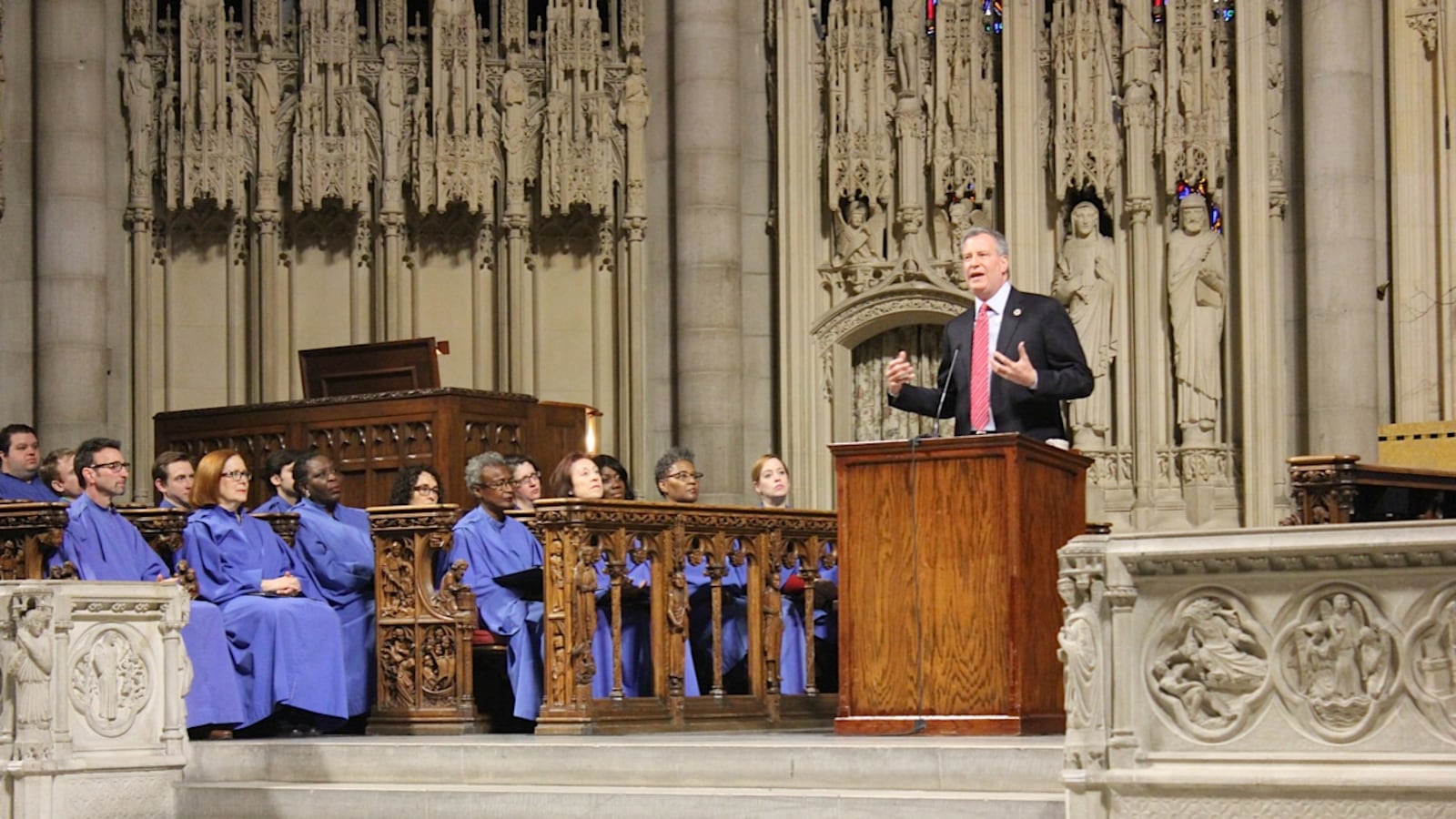In his first major education address, Mayor Bill de Blasio painted a picture of a system in crisis.
“We need to be able to say that despite the good efforts of so many, the school system is still broken in so many ways,” the mayor said.
It was the theme of de Blasio’s first lengthy attempt to offer his vision for the city’s school system, outside of debates about charter schools and pre-kindergarten funding that have dominated his first three months as mayor. But before getting to some of the big ideas, he offered a mea culpa over his handling of some recent charter school decisions.
“I have to tell you, I didn’t measure up when it came to explaining those decisions to the people of this city,” de Blasio told the Sunday crowd at Morningside Heights’ Riverside Church.
The mayor was indirectly referring to his administration’s decision to nix three space-sharing plans involving Success Academy charter schools, which has metastasized into a public relations mess for de Blasio—even though the city gave the green light to 19 other charter school plans.
Those reversals, and de Blasio’s laser focus on his campaign to increase New Yorkers’ access to pre-K for their four-year-olds and after-school programs for their middle schoolers, have meant the mayor has spent little time defining his vision for the rest of the city’s school system.
De Blasio didn’t mince words in Sunday’s speech, calling the status quo “a tragedy.” He cited the fact that less than two-thirds of the city’s students graduate on time and only 20 percent of students of color are at grade level by the third grade.
“So many parents are simply looking for the best for their children. And sadly, they don’t see it enough in their neighborhood school,” de Blasio said. “That’s a reality I won’t accept. I want that parent to know that we will not accept a neighborhood school that fails them.”
“I know Chancellor [Carmen] Fariña feels the same urgency I do,” he continued. “Our mission is to create a city in which regardless of zip code, your neighborhood public school is a great option for your child.”
That phrasing combined the rhetoric of his predecessor Michael Bloomberg, who spoke of the urgent need to reform the city’s school system, and many of de Blasio’s allies, who are much cooler toward charter schools and want the city’s focus to be on improving traditional public schools.
De Blasio didn’t offer any new proposals, instead calling for a unified acknowledgement of the “root causes” of the city’s problems.
“I know people of every ideology who want to shake the foundations. I know teachers in traditional public schools who want to shake the foundations. I know charter school teachers who want to shake the foundations. But what can unify us is that sense of urgency,” he said.
That’s a very different tone than de Blasio’s schools chancellor has been taking in her first three months. Fariña has focused more on building rapport with teachers and principals than on explaining how the system isn’t up to par or spelling out specific goals for academic achievement or graduation rates. De Blasio, whose administration is also currently negotiating a contract with the teachers union, has been less shy about saying he thinks the city has a long way to go.
On charter schools themselves, de Blasio offered a mix of positions, some of them contradictory.
He said he wanted to “re-engage” with the idea that charter schools can develop models for traditional public schools to learn from, but also implied that he disapproved entirely of encouraging the charter sector to improve things for only a subset of the city’s students.
“The answer is not to find an escape route that some can follow and some can’t. The answer is to fix the entire system,” he said.
For de Blasio, that starts with pre-K. As budget proposals near completion in Albany, it seems likely that de Blasio will soon be outmaneuvered when it comes to funding his expansion of pre-K and after-school programs, since Gov. Andrew Cuomo’s plan to pay for the plan for without raising taxes seems to have a broader appeal among lawmakers in Albany than de Blasio’s plan among lawmakers, who must approve the funding source.
Still, de Blasio was eager to portray the city as being on the cusp of big changes, thanks to Albany’s decisionmakers.
“I know in the next few days, the world will change before our very eyes,” he said.

